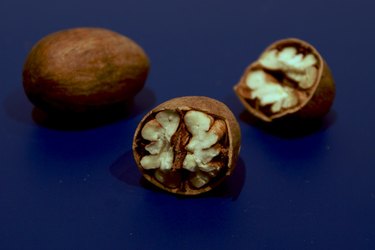
Pecans have long been a favorite for use in pies, turkey stuffing, candies, and for eating right out of the shell. In addition to the edible nut, pecan trees provide food for various wildlife and are a good choice for home landscaping and orchards. Of the more than 500 varieties of pecan trees worldwide, papershell pecans are a type of very sweet pecan with a soft shell that can be easily cracked.
Mahan, Success, And Stuart Papershell Pecans
Video of the Day

The Mahan pecan, the largest pecan grown, is a long, slender nut that measures about 21/2 inches long and has a rich, flavorful and dense kernel. Mahan pecan trees are vigorous growing and produce pecans that average about 31 nuts per pound.
Video of the Day
The large and sturdy Success pecan tree is an early bearer, yielding pecans characterized by thin shells and nut meats that can be removed in neat halves.
Favored for being easily grown in all soil types and in many areas of the United States, the Stuart pecan tree is fast-growing, hardy and early ripening. Stuart pecans are generally large in size but smaller than the Mahan.
Additional Papershell Pecan Varieties

Additional papershell pecan tree varieties include Mohawk, Cheyenne, Desirable, and Choctaw. High-quality Mohawk pecans, which mature early, have noticeably thin shells.
Cheyenne pecans are medium-sized nuts with a good quality kernel. Because Cheyenne trees are heavy bearers and the nuts ripen at an early age, they're considered ideal for either farm or home orchards.
The Desirable pecan tree lives up to its name for more than one reason. In addition to producing a good-sized nut, the tree is known for vigorous growth and being disease resistant.
The Choctaw tree produces a large nut with a thin hull and a higher-than-average oil content.
Pecan Tree Habitat And Uses

In the United States, pecan trees are found primarily in areas of Texas, Kansas, Mississippi, Tennessee, Ohio, Kentucky and Alabama. In terms of commercial uses, pecan trees provide nuts widely used as a snack and in food products. In addition to their rich and versatile taste, pecan nuts offer ease-of-use; they can be conveniently stored for up to six months in the refrigerator and for much longer in the freezer. Pecans, however, easily absorb odors from other fruits and vegetables so they should be placed in an airtight container to maintain maximum quality and taste.
The wood of the pecan tree itself is also highly valued. Over the years, pecan tree wood has become a popular choice for furniture, distinctive home furnishings, and interior enhancements such as wall paneling.